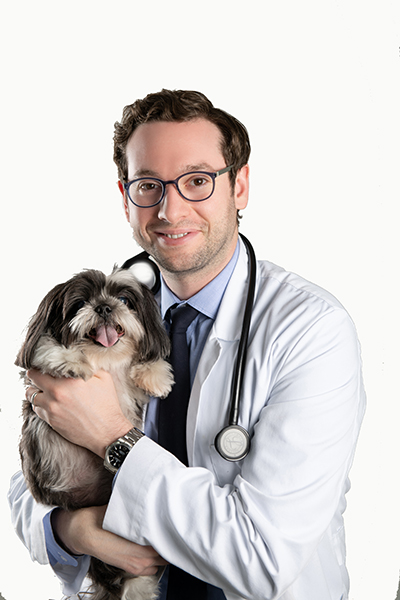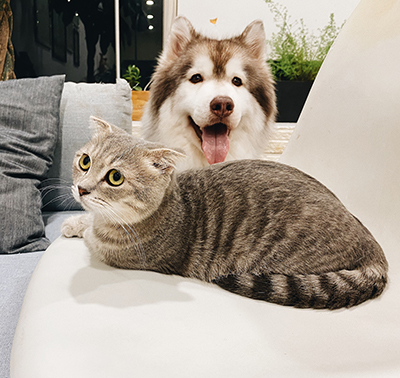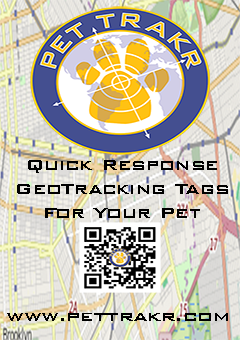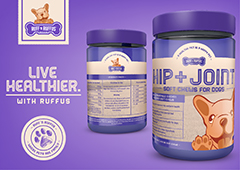New Pup In The Family?
Top Ten Questions For Your Vet
By Crystal C. Long
Ahhh! The excitement that comes with getting a dog: the naming, setting up its fur-ever home, lots (and lots) of pictures of your new fur-kid (whether puppy or senior), and of course, our personal favorite—shopping for toys. But among all the fever and excitement for the new furry addition to your family, there are some essential steps you need to take to guarantee your dog stays happy and healthy. Now mind you, there are lots of things to consider, like vital vaccinations and vitamins, best type of dog food, and how to help your pet learn good habits…don’t just go on the advice of friends, connect with your vet. Rescue or purebred, old or young, take charge of the essentials for establishing a good start for a long and healthy life together.
PET LIFESTYLES sat down with Dr. Brett Shorenstein VMD, owner of Abingdon Square Veterinary Clinic to answer the critical questions on a new dog-parent’s mind. Trust us, your dog will thank you for being prepared.
When do I take my dog for their first checkup?
It’s important to establish veterinary care for your puppy as soon as possible after adoption. Puppies need vaccinations and parasite testing right away—their developing immune systems mean they can become seriously ill very quickly if exposed to disease. For adult rescues who have already been vaccinated, it’s still critical to bring them to your veterinarian as soon as possible to establish a relationship between your pet and their new vet.

What vaccinations are essential for my dog - there has been an anti-vaxer movement, what are the hazards of not keeping up the shots?
Vaccinations are your pet’s first line of defense and can also keep them from transmitting some diseases to your family. Scientific evidence proves that the widespread use of vaccines in the last century has prevented death and disease in millions of animals and humans. Even diseases that have become uncommon can still be present in the environment and if pets aren’t protected, they can initiate an outbreak.
“Core” vaccines are those recommended—and in some cases, mandated by law—for most pets. Core vaccines include:
- Rabies (dogs and cats)
- DA2PPV – Distemper, Hepatitis, Adenovirus 2, Parvo and Parainfluenza (dogs)
Depending on your lifestyle, vaccinating against leptospirosis, an organism found in the urine of mice and rats, or Lyme disease is also important. Bordetella and canine influenza (CIV) shots are a must if your pup frequents dog parks, boarding kennels, or any place where they’re socializing with other canines.
With regard to the anti-vax movement, there is a risk associated with all medical procedures, but serious reactions from vaccines are rare. Given the fact that vaccinations have protected millions of animals and humans from illness and death caused by disease, the benefit far outweighs any risk. At Abingdon Square Vet, we have seen VERY FEW adverse reactions.
Do you recommend home cooked or commercial dog food - are there basics to look for or avoid - some pets have gluten allergies, is gluten something to avoid in general?
If you feed your pet a grain-free diet, home-cooked meals, or food with exotic and atypical ingredients, you may want to reconsider. Veterinary cardiologists, nutritionists and the U.S. Food and Drug Administration have explored a possible link between those types of diets and the development of dilated cardiomyopathy (DCM) in dogs. DCM can result in abnormal heart rhythms, congestive heart failure and even sudden death. When it comes to feeding your pets, we recommend avoiding a grain-free, exotic protein, vegetarian or completely home-prepared diet. Instead, choose a commercial pet food made by a well-established manufacturer that contains common ingredients, including grains.

Do you need Pet Insurance - are there brands you like better than others?
At Abingdon Square Vet, we believe in pet insurance. We’ve seen it help families take better care of their animal companions and afford life-saving procedures for their pets. There are many health insurance and wellness plan options; like health insurance for people, pet policies have different deductibles, co-payments, and premiums.
What is best a natural flea/tick repellant or prescription?
Frankly, there is no “natural” flea/tick repellant on the market that has proven to be 100% effective. The safest and most effective preventatives are those prescribed by your veterinarian there are a variety of options however it’s best to get your vet’s advice in choosing the best preventative for your pet’s needs.
Is it necessary to get my dog neutered?
While it is not necessary to neuter your dog, it is highly recommended. According to the Humane Society of the United States, between 6- 8 million pets enter U.S. animal shelters every year. Only about half are adopted, meaning the rest—mostly healthy, adoptable dogs and cats—are euthanized. Neutering your pet comes with additional benefits: Your dog will likely be healthier. Altered pets have less urge to roam, which reduces the exposure to parasites and disease, and spay/neuter also reduces the risk of certain types of cancer in both dogs and cats.
Should I brush my dog’s teeth?
Yes, absolutely! Imagine if you never brushed your teeth or had them cleaned. Pretty scary, right? As you can guess, things would eventually start to go very, very bad inside your mouth: teeth would decay, gums would become inflamed and infected. Bacteria from those rotting teeth would eventually travel into your bloodstream and could cause other serious health problems. And we haven’t even mentioned the daily, debilitating pain.

How often should I feed my puppy/adult dog? Some are picky eaters and some are non- stop eaters, how do you suggest managing this to keep their pet’s weight under control?
We typically recommend feeding puppies three times per day until 16 weeks of age and then transition to twice a day feeding. It’s best to designate specific mealtimes as opposed to grazing as grazing can lead to obesity. However, some dogs prefer to graze and these are not typically the over-eaters.
Are treats ok and if so how often?
Treats are always okay in moderation! Pets love a good snack, but many treats are high in sugars and fats. For canines, instead of cookie-style treats, give them baby carrots, celery, cucumbers, and string beans. But with any treats, moderation is key.
If my dog or cat doesn’t feel well and you are closed, where should I go? Pets are not always sick at most convenient times.
If you experience a pet health emergency outside of our office hours, please contact The Animal Medical Center of NYC at (212) 838-8100 or BluePearl Pet Hospital, Downtown NYC location at 212.924.3311.











